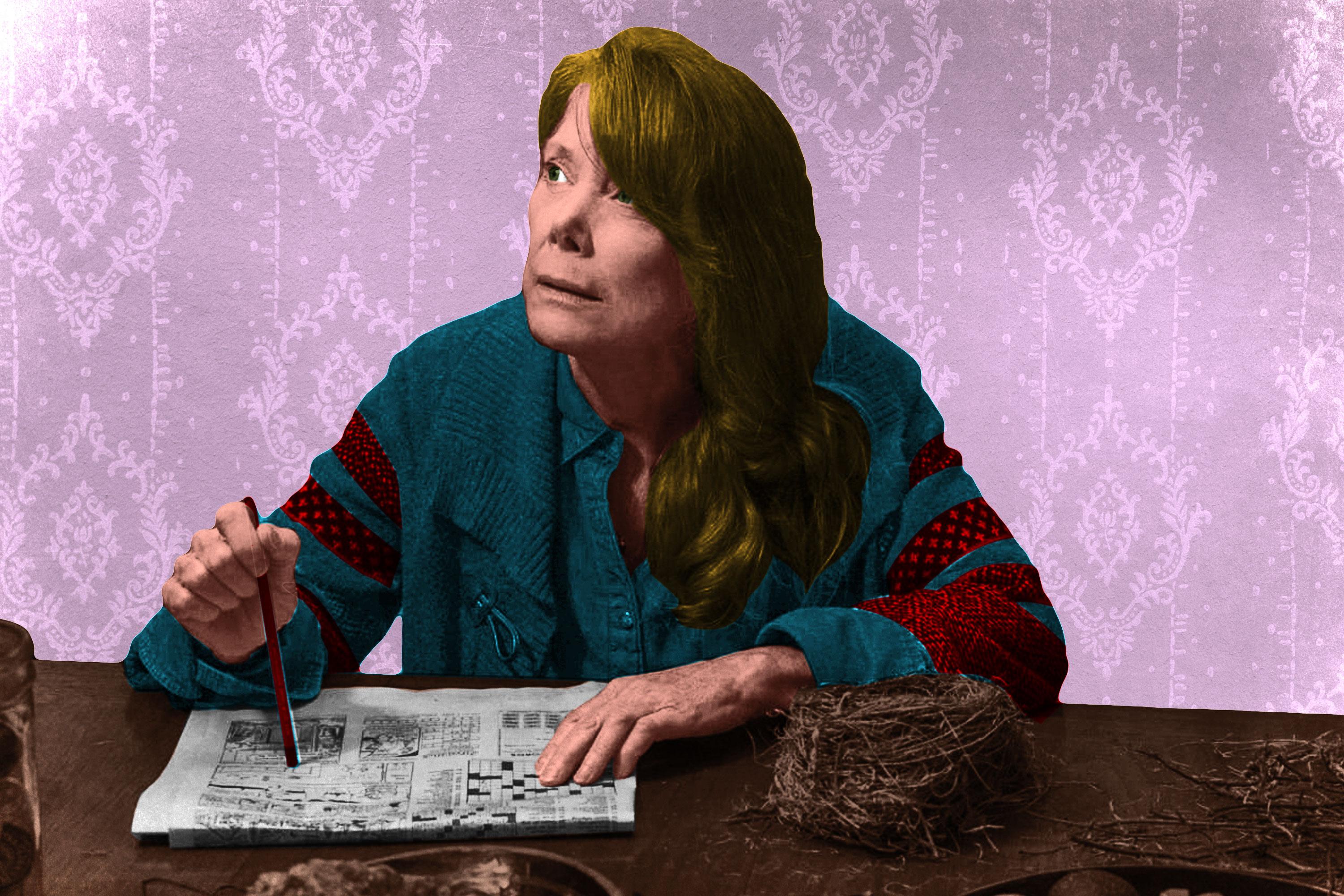

Considering Stephen King has been scaring audiences for the better part of four decades, it’s surprising it took so long for someone to imagine what it would feel like to exist in the storyteller’s world. That is the basic conceit of Hulu’s Castle Rock, an anthology series that pays deference to King’s oeuvre (the fictional town is set in Maine, naturally), leaning on the viewer’s familiarity with it while simultaneously attempting to make something entirely novel.
The result, after the first six episodes of the first season, was a mixed bag. Castle Rock had an innate understanding of the atmospheric details that make King’s universe so effective: the way the mundane is disrupted by domestic terrors, and the suggestive, increasingly overwhelming hints that supernatural forces are at play. On top of that, as multiple outlets have been fastidiously chronicling, Castle Rock was practically overflowing with Easter eggs for Stephen King devotees to discover. Some of them were largely inessential—did Jane Levy’s character need to be related to The Shining’s Jack Torrance?—while others, like the prominent use of Shawshank State Prison, reinforced the show’s narrative.
But for viewers who weren’t yearning for a King-related homework assignment—or who didn’t even go into the series with any predilections for the author—in its early episodes, Castle Rock didn’t have much substance underneath its uncannily creepy aura. The languid pace of the initial premise, in which death row attorney Henry Deaver (played by André Holland) is summoned back to his hometown to confront his own demons and unpack a mysterious case at Shawshank, rarely gave way to meaningful revelations.
Given the abundance of options on television, it’s as difficult as it’s ever been for audiences to practice patience and wait for a show—even one with the production value and pedigree of Castle Rock—to really find its footing. (Because it’s the summer of 2018, we might as well call it the Succession Dilemma.) While the first three episodes of Castle Rock dropped together on the streamer on July 25, the show has since reverted to once-a-week installments that have stalled the show’s momentum—labyrinthine plotting and extended showcases of pure mood in favor of character development and actual stakes isn’t easy to swallow in hourly installments. The traditional streaming-release model—offering an entire series all at once—might have the negative effect of rendering episodic television obsolete, but it does suit shows like Castle Rock, ones that are constructed like long movies rather than TV series.
But those who have stayed patient with Castle Rock were finally, duly rewarded on Wednesday with not only the series’ best episode to date, but one of the finest episodes of television this year. “The Queen,” the season’s seventh episode, not only managed to answer some of the show’s long-delayed questions, but distinguished itself by working nearly as well as a stand-alone episode—an anthology within the anthology. The episode not only transcends the vaguely menacing aura that’s been enveloping the town, but builds to a crushing climax that presents genuine emotional stakes for the first time in the series.
“The Queen” chronicles a day within the mind of Ruth Deaver (played by the great Sissy Spacek), Henry’s adoptive mother whose early onset dementia—or at least, a close approximation of the disease—causes her to veer between different events of her past, both good and bad. For much of the series up to this point, Ruth has gazed into the distance as the show has declined to delve further into her motivations, but “The Queen” explains the depths to which Ruth’s been trapped within the maze of her fractured mind. On several occasions, the episode jumps back in time to earlier scenes in the series, this time showing them from Ruth’s perspective, which finally permits viewers a clearer picture of its erstwhile hazy narrative.
What helps ground Ruth in the present are the Lewis Chessmen she scatters throughout her home. As she explains to her grandson, Wendell: “These are my breadcrumbs. If I find a chess piece ... I know it’s now, not then, and I can find my way out of the woods.” Ruth’s Hansel and Gretel reference notwithstanding, the conceit of “The Queen” is not unlike The Ringer’s best TV episode of the century, Lost’s “The Constant,” in which Desmond’s consciousness becomes unstuck in time as he tries to stabilize himself by making contact with his love, Penny. It’s within this framework that Castle Rock provides some much-needed backstory for the Deaver family dynamic, which had only been vaguely explained in the previous episodes.
By returning to Ruth’s past, we learn more about the religious-tinged malevolence she and Henry fell victim to at the hands of her late husband Matthew, who was keenly aware that Ruth was also in love with Sheriff Alan Pangborn (played by Scott Glenn in the present timeline), who decades later moved in with Ruth upon returning to town. While some of Ruth’s memories—especially those of Henry—are happy ones, she is also tormented by past decisions that can’t be undone, like Alan’s offer to flee from her emotionally abusive husband with Henry in tow.
These painful memories are juxtaposed with Ruth’s current predicament: a twisted game of cat-and-mouse in her own home with “the Kid” (Bill Skarsgard), an enigmatic, insidious stranger channeling her dead husband’s spirit. Convinced she needs to kill the Kid to be freed from Matthew’s presence in her fragmented memories, she corrals the bullets from Matthew’s old gun and fires on her presumed tormentor. The episode reaches its devastating crescendo when Ruth realizes she shot Alan, who’d come to help her. The next morning, Ruth is back in the past—revisiting the day that Alan came back into her life, wondering whether they can start anew. With Max Richter’s existentially depressing “On the Nature of Daylight” scoring the scene, Ruth holds onto the love of her life with a simple plea—“Don’t leave”—as she ignores the chess pieces perched on the stairwell.
What makes “The Queen” such a distinct, brilliant, and unrivaled episode is how effortlessly it drives the plot by embracing a more intimate and simple story structure. Stripped down, the episode goes beyond showing what Ruth is experiencing—it shows what she’s feeling. No other character on Castle Rock has been as carefully examined as she is in that hour, and aside from the title of the episode—which is as much a reference to Spacek playing the infamous prom queen in Carrie as it is about a chess piece—“The Queen” isn’t predicated on King-related Easter eggs or broader world-building. At its core, the episode is a tragic love story and a heartbreaking glimpse into the deterioration of one’s mind. And it is all of these things without sacrificing the bone-chilling thrills that the show so cherishes.
The key to Stephen King’s best works aren’t the monsters or the supernatural elements, but the everyday people who prove to be staggeringly capable of committing horrible atrocities. The most chilling part of It is the town’s complicity in its own inhabitants being killed by a monster that’s lived there for centuries; Misery’s antagonist is a superfan of a famed author whose obsession metastasizes into violence; the scariest part of The Shining isn’t the rotting corpse in Room 237, but the realization that Jack’s been losing his mind for a lot longer than previously thought. The true horror of Stephen King’s finest novels has always been found in the relatively restrained, human-driven elements of the stories—made all the more effective by the haunting scenarios in which they’re set.
Castle Rock spent the first six episodes of its inaugural season going big and broadening its scope; it’s now turned the corner by compressing, focusing in on the characters who inhabit the story, rather than the world in which the characters exist. With “The Queen,” Castle Rock has laid the breadcrumbs to lead itself out of the woods of mundanity and into something special.

